When disaster strikes, there’s a pretty good chance your local grocery stores will be stripped bare in a matter of hours. From panicked people trying to stock up on last-minute supplies to those who failed to prepare for even short-term disasters and now find themselves facing the prospect of starving, your local grocery store will look like a battleground in a post-apocalyptic movie.
Most grocery stores have a maximum three-day supply of goods on hand before they run dry. That means even short-term disasters like hurricanes, floods, and earthquakes can cause supply chain problems that will quickly wipe out their inventory. Now throw in a long-term disaster that cuts off supplies for months, and you have a real recipe for disaster.
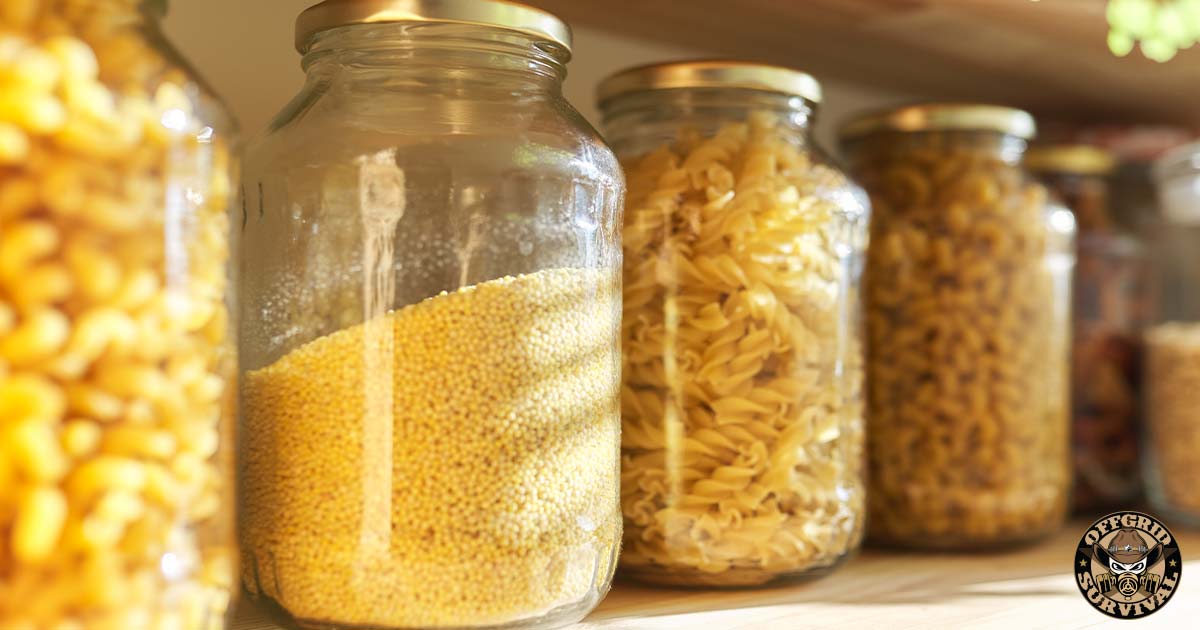
To be prepared to face an emergency situation where supply chains fail and food deliveries are blocked, you need to invest in a long-term food supply. This supply should be made up of at least six months’ worth of emergency food with a long shelf-life – preferably something that you already eat.
From Supermarket Shelves to Survival Pantry: Building Your Emergency Food Stockpile with Long-Lasting Food From The Grocery Store
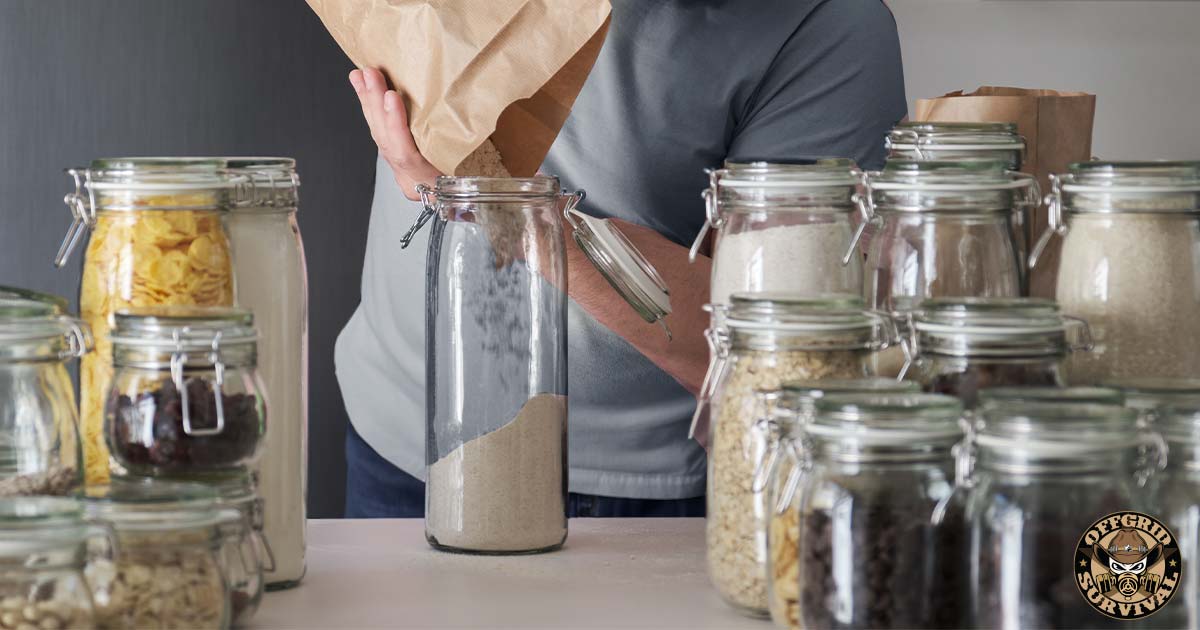
In the face of so many uncertainties, it’s important to ensure you and your loved ones’ survival by stocking an emergency pantry with long-lasting food supplies. While many so-called survival experts try selling commercial ‘survival food’ as the answer, we advocate for building your stockpile with familiar foods you probably already eat – all from your local grocery store or farmer’s markets.
During an emergency situation, the last thing you want to do is eat a bunch of weird survival foods that you’ve never eaten before – from possible allergy concerns to the stuff just downright tasting like crap, now is not the time to start experimenting. On top of that, we don’t like wasting money, so buying foods you already eat and running them on a rotation system that ensures you don’t find yourself years from now with a pantry full of expired food!
With the help of suggestions that have come in from our readers, we have compiled a list of the top food items and emergency supplies that you can buy at the grocery store. The list contains foods with a long shelf-life, items that have multiple uses, and supplies that are great for bartering.
Survival Foods that add flavor & comfort:
Comfort foods can be a huge morale booster during a stressful survival situation, something that needs to be kept in mind when starting to stockpile food. These four things can be stored for over 10 years, and are a great way to add a little bit of flavor to your cooking. If stored properly they will probably last indefinitely.
- Salt: From food preservation to maintaining proper electrolyte balance in the body to enhancing the flavor of your food, salt is an an essential part of your food storage stockpile!
- Sugar: – Brown or White sugars can be stored for quite some time and during emergencies or high-stress situations can help boost energy levels and provide a quick source of fuel. It can also be a huge morale booster when things start getting tough.
- Raw Honey: Honey has an incredibly long shelf life contains numerous vitamins, minerals, and antioxidants. Honey has also been used for centuries as a natural remedy for wound healing due to its antimicrobial properties.
- Alcohol – Whiskey, Vodka, etc.: From bartering to health and medicinal uses, alcohol is one of those items that should be part of any good preparedness stockpile. Check out our article on which liquors are best to stockpile for preparedness.
Base cooking ingredients with a long shelf life
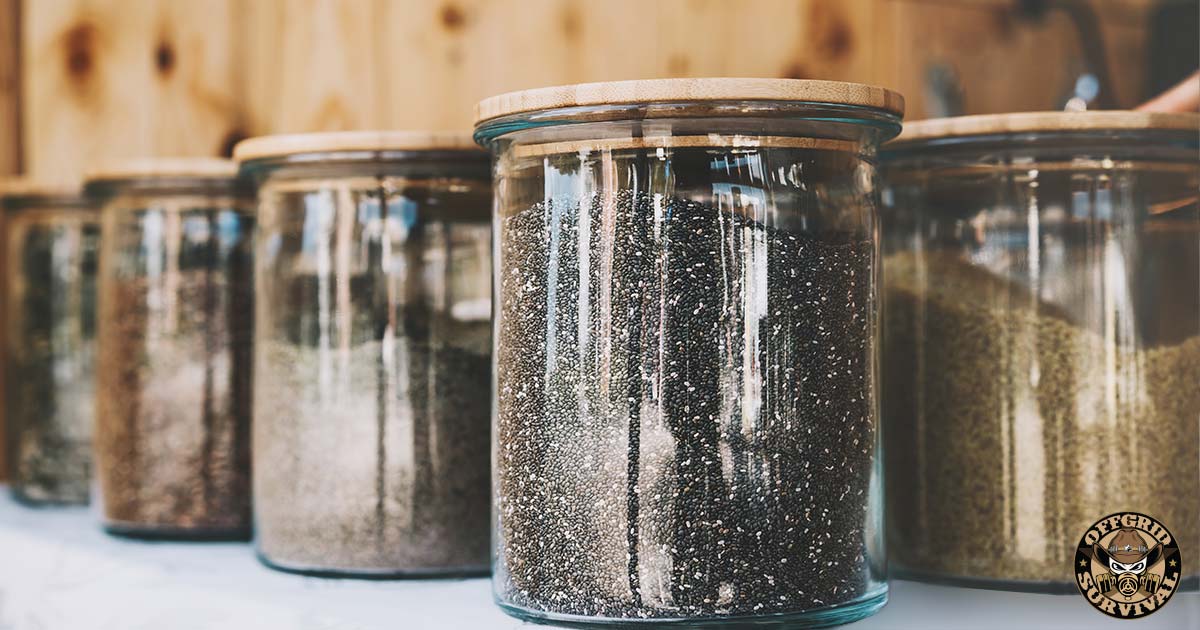
Many people today lack the ability to cook anything from scratch, relying heavily on prepackaged and processed foods. This trend is unhealthy, but it could prove deadly during a long-term survival situation. Learning how to cook from basic ingredients is crucial for successfully preparing for emergencies and ensuring self-sufficiency in food storage.
The following categories of food make up the foundation of most recipes and are all things that store well.
Hard Grains: Stored properly hard grains have a shelf life of around 10 – 12 years.
- Buckwheat
- Dry Corn
- Kamut
- Hard Red Wheat
- Soft White Wheat
- Millet
- Durum wheat
- Spelt
Soft grains: These soft grains will last around 8 years at 70 degrees, sealed without oxygen.
- Barley,
- Oat Groats,
- Quinoa
- Rye
Beans: Sealed and kept away from oxygen the following beans can last for around 8 – 10 years.
- Pinto Beans
- Kidney Beans
- Lentils
- Lima Beans
- Adzuki Beans
- Garbanzo Beans
- Mung Beans
- Black Turtle Beans
- Blackeye Beans
Flours and Mixes and Pastas: 5 – 8 years
- All Purpose Flour
- White Flour
- Whole Wheat Flour
- Cornmeal
- Pasta
- White Rice ( up to 10 years)
Oils: It’s important to include fats in your stockpile. Fats are a concentrated source of energy and are crucial for overall health and well-being.
- Coconut oil – Unrefined, virgin coconut oil has one of the longest shelf lives of any kind of oil. It can last for over 2 years, has numerous health benefits, and is a great item to add to your survival food supply list.
- Clarified butter (Ghee): Clarified butter, also known as ghee, is butter that has been heated to remove moisture and milk solids. The process increases the fats stability and extends its shelf life. Ghee can last for several months to a year when stored in an airtight container in a cool, dark place.
- Olive oil: Extra virgin olive oil has a decent shelf life and can be stored for up to a year or more if kept in a cool, dark location.
For more information on cooking from scratch, check out these articles and books:
- Important Homesteading Preparedness Skills: Learn how to cook from scratch
- Best War Time Recipes: A Look at Preparedness Cooking Skills from the Past
- Fanny Farmer Cookbook
- Better Homes and Gardens Cookbook
- The Pioneer Woman’s Cookbooks
What About Buying Canned Goods for your Survival Pantry?
Proper Storage and Shelf Life of Canned Goods
We get a lot of questions on canned goods and how long they can safely be stored. To ensure the quality and safety of canned goods, it’s important to store them correctly and be aware of how long the manufacturer recommends they be stored. And remember, most best-by dates are placed there to protect the manufacturer from lawsuits, The U.S. Department of Agriculture says that most shelf-stable foods are safe indefinitely. In fact, they say canned goods will last for years and that dating is for quality, not safety.
Here are some guidelines to follow when dealing with store-bought canned goods and most shelf-stable foods:
1. Storage: Keep commercially canned foods and other shelf-stable products in a cool, dry location. Avoid placing them above the stove, under the sink, or in areas prone to high humidity or temperature fluctuations, such as a damp garage or basement.
2. Shelf life: The shelf life of canned goods varies depending on the type of food. High-acid foods like tomatoes and fruits maintain their best quality for up to 18 months, while low-acid foods such as meat and vegetables can maintain their original quality for 2 to 5 years. But again, if cans are undamaged (no dents, swelling, or rust) and have been stored properly in a cool, clean, dry environment, they can remain safe indefinitely.
3. Safety precautions: While extremely rare, the production of toxins by Clostridium botulinum bacteria poses the most significant risk when dealing with canned goods. To minimize the risk, make sure your cans are in good condition and show no signs of damage or contamination. If any cans appear compromised (bulges or leaks), it’s best to get rid of them to avoid any potential health hazards.
For more information on canning your own foods at home, check out our article on Canning your own food!
Survival Foods that are great during short-term disasters
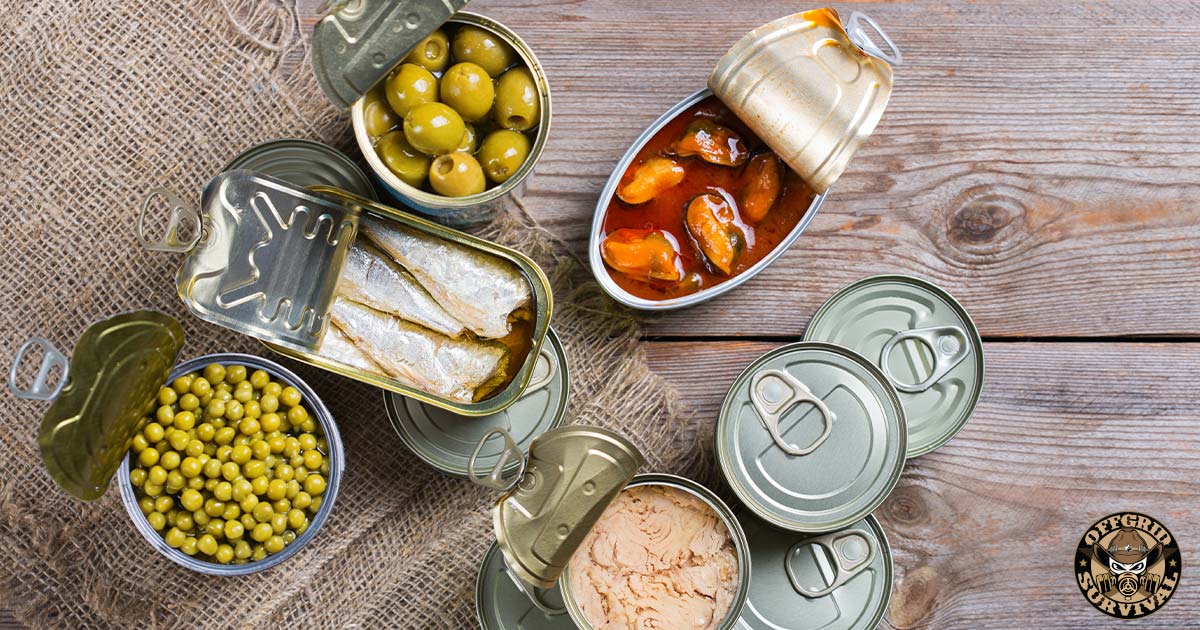
The following items are great for short-term emergencies, and will stay fresh for a long period of time. During most disasters, you’re going to want to have food that requires very little cooking, or can be eaten without any preparation at all. Make sure some of your stockpile includes these types of food.
Other good survival foods: 2 – 5 years of shelf life
- Canned Fish: Tuna, Salmon, Sardines
- Canned Meats: Chicken, Beef, Pork, Spam & Sausages
- Canned Vegetables & Fruits
- Peanut Butter
- Coffee
- Tea
- Ramen Noodles – not the greatest food in the world but they are very cheap so they made the survival food list.
- Hard Candy
- Powdered milk
- Dried herbs and spices
- Canned soups (a variety of flavors)
- Canned pasta sauces
- Canned broth or stock (chicken, beef, or vegetable)
- Crackers or rice cakes
- Dried fruits (raisins, apricots, cranberries)
- Nuts (almonds, walnuts, peanuts)
- Granola bars or energy bars
- Cereal or granola
Items that can be used for more than cooking:
- Apple Cider Vinegar – Cleaning, cooking and has antibiotic properties
- Baking Soda – Cleaning, cooking, etc…
- Honey – Mentioned again for its antibiotic properties and wound healing.
Nonfood items to stock up on at the grocery store:
- Bic Lighters
- Toilet Paper
- Soaps
- Bottled Water
- Multi-vitamins or supplements
- Medicines
- Bandages
- Peroxide
- Lighter fluid
- Canning Supplies
- Charcoal
More Emergency Food Resources
While we always advise the DIY approach to stockpiling food, this way you have the things that you would normally cook and eat and can then rotate them in and out of your normal life, there are some circumstances where commercially made survival food supplies might make sense. Here are some of the top emergency survival foods that can help you quickly bulk up your emergency supplies.

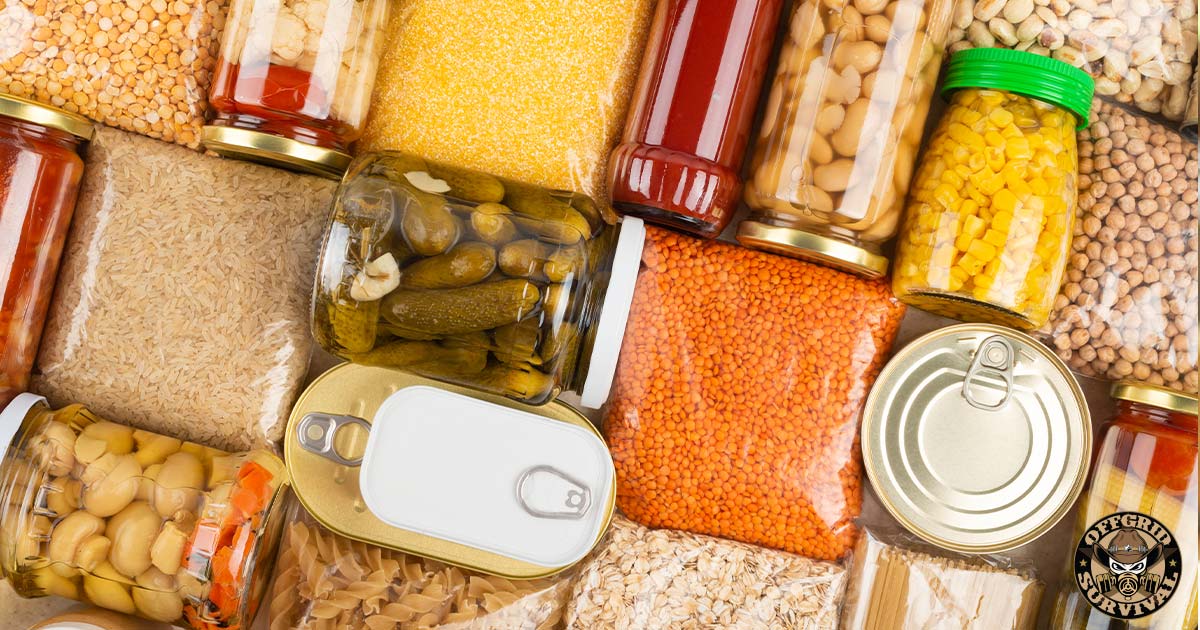


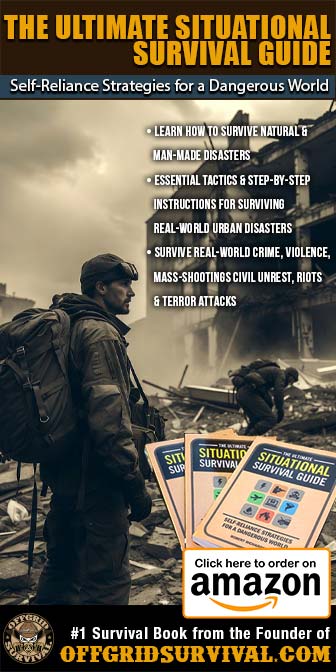



The information on flour storage concerns me. Morman storage ctrs, flour manufactures such as robin hood or king arthur and others set the maximum storage for white flours at 18 mths mac with or without vaccuum sealing or oxygen obsorber treatments. Also whole wheat flours have almost no long-term storage capacity. They turn rancid very fast. Many you find on grocery shelves are already rancid at purchase. I have ground whole wheat for 20 years and my experience is the same as the flour manufacturers. Just an FYI so people don’t waste money storaging flour long term.
Thanks for the list.
Makes me feel better about the choices I made a few years ago vacuum packing and storing emergency supplies, and gives me more ideas to supplement my stocks.
No mention of bleach for purification of water? You can drink practically any water by first purifying it with bleach 8-16 drops per gallon.
TP is a bulky think to carry. Baby wipes will do the job and aren’t as bulky. If they were good enough for my little guys bottom, they are good enough for mine!
I’m surprised to hear no mention of nuts! They don’t go rancid very quickly if they’re not roasted, and they have fat, protein, and carbs, depending on the variety, not to mention TONS of vitamins. They’re also incredibly calorie-dense. Buy bulk raw, seal them in airtight containers and keep them in the extra room in your fridge until d-day. I don’t recommend the freezer, since they’ll eventually frostbite unless you have a real vacuum pack. Some nuts are naturally more stable in warmer climates than others; do some research. If you’re afraid you’ll get bored with nuts, take a look at a vegan raw recipe book, and you’ll learn all sorts of tricks for making nuts taste like “normal” food. I recommend “Ani’s Raw Food Kitchen.” I’ve practically lived off them for weeks at a time, with ample fruits, veggies, salt, and herbs mixed in.
For prepping freshly grown foods, canning is great if you have fuel, time, jars, water, etc. However, a solar dehydrator will be much more useful in emergency situations.
That is a good point.
What about soybeans? How long can organic, non GMO soybeans be stored?
One thing I think has been overlooked in emergency preparedness for survival is to also have a device to filter the air you breath. We do live in some dangerous times.
I am saying that this is not right what is going on. The good people are suffering and will suffer more and all these bad people are getting away with doing bad things.
Maybe it is time for the states to govern themselves then there would be no federal government. Its time to start over
It dose not matter if you’re old young or well prepared, shit will be very hard out there and all that separates the living from the dead could be a little luck although it would be very wise to augment it with some survival skills and supplies
i read through some of the comments and all I can say is we are in a boat load of trouble if or when we ever need to use our survival skills. You are turning on each other now, and things are still good. Oh boy!
Also important to have a sturdy hand turned grinder for turning hard grains into flour.
My thoughts are if you are lucky enough to have a bug out location, stock it well. One of the best gifts hubby ever bought me was a vacuum sealer. Everything gets sealed. When buying seed, vacuum seal it so it will last longer, label the packages so you know exactly what’s in each one. Stock up also on seed starting materials (peat pots, ect.). ALSO, while stocking your bug out location, make a small stock pile in your residence, in case you get stuck there and can’t get out right away. So many great tips on this site. One last thing, I don’t recall seeing anyone mention, small portable solar units (we bought one a couple of years ago and use it camping), small portable generators, or chainsaws. We go “primitive” camping every summer for a week just to work on our skills. Every year we find more things we don’t need, because we haven’t used them.(example only needed 1 cast iron skillet, not 3.) It helps keep us sharp. Everyone keep posting the great ideas, they’re very helpful.
using a chainsaw is not going ‘primitive’maybe using an axe and a bow saw and that’s still not ‘primitive’ but a lot closer to a stone axe!
I suggest you keep the chainsaw but also stock up on bow saw and replacement blades… a chainsaw can be heard for mile not so w/ a bow saw…noise dicipline will be important too!
How to increase the shelf life of food bar?
I like your lists but your shelf life times are wrong on many of the foods. The shelf for much of these foods are much longer.
great simple list. I didn’t think of some things you mention. Yes, simple if running away – you’ll meet a lot of people doing the same if not stealing from you. Seniors – care about them, families – care about them, neighbors, care about them…good group – find one. Best person to know – JESUS – all others may desert you. Got your little Bible? hope you know about HIM – the only one who sticks with you through it all. All the suggestions are good but talk it out with some – what’s best for YOU and those you care about. Neighborhood plan – you stock this, I’ll stock that…may work for some. All need to stock a variety of things, who knows how much – suggestions heard – if you can – 6 months. That may be able to stretch some. Thanks for all the ideas-grocery store? have lots of peanutbutter, canned items, dry items, and garden, chickens turkey, goats-your own milk source, save things to start fire for heat,cooking,sterilizing. May you all survive – if so, a new entry – how did you fare?…
I got on this site for help in prepping and I am shocked at the comments. This bashing each other is not helpful. Could you all try to stick to the intentions of the site and keep your comments to what you actually know to be fact about any given subject? It would really be appreciated. thank you.
Forget the peroxide, H2O2.. yes, one more oxygen atom than water, with very little age, 1 month and or joggleing, light etc. you have a bottle of water.It does not keep, and if You get it on sale at wallyworld it is outdated and already flat, ever notice how it doesn’t foam, forget buying it on the internet as it is just bottled water. White Rice, Pasta and canned meat and Vegatables,Beans,Coffee spaghetti sauce in Glass Jars! Canned Fruit, Sugar, Salt and Propane canisters and one of those mechanical spark producers welders use as well as propane cook stove, heater will be good food supplies. Honey can heal wounds and kill athletes foot and other fungi. not fungi or bacteria grow in honey.. I could go on but you get the idea, white rice and pasta will keep for 30 years if stored propperly.
The very reason we may end up using foods with long shelf lives is the attitudes our young people have…they have lost compassion..morals and values..they care about nothing except their selves and whats in it for them.
When crap hits the fan…many of them will not survive because they don’t know how to …life isn’t a video game…if you make a mistake when you depend on mother nature she does not forgive…and your character doesn’t respawn !!!
Wisdom is absent in most young now a days…and the ways of doing things that were done in the “old days” are unknown to them…one day these young fools will be begging for the secrets that the old ones know.
I am so glad that my Grandmother taught me skills that most young ladies turn their noses up at today. She taught me how to crochet, knit, embroider and sew. She also taught me about baking. Throughout my life i have picked up many good things from the elderly..how to make bread from scratch…how to cook…how to hunt..how to find herbs and edibles in the wild…how to build shelters to survive the elements and above all else they taught me about God which i am eternally thankful for.
Ok, but what about long long term. Let’s say 100 years. If tin and aluminum cans take about 50-100 years to biodegrade, is it safe to assume that 102 year-old can of food (assuming it’s free of clostridium botulinum bacteria) is safe? What really gets to me is that we don’t know the shelf life or efficacy of most medications. Or at least ordinary people like me don’t, considering I have no .gov or .mil account to access SLEP. I can’t imagine the shelf life of penicillin can be more than 10 years tops, plus, with a little skill and the right chemicals it can be made, but what about pain killers? Assuming you have access to plants and know how to use them, you’re still looking at some really mild pain relief options. Feverfew won’t help you if you’re damn leg is broken. I would imagine that properly stored and sealed morphine has a longer shelf life than any of us can imagine, but I have no way to test it or prove it.